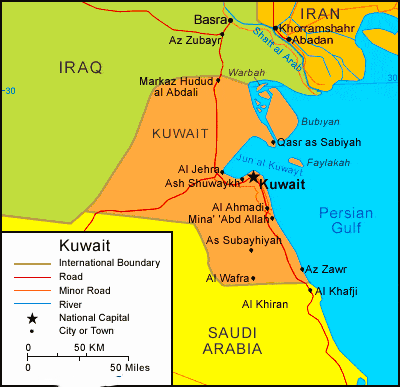
Important for UPSC, State PCS
Prelims: Gulf Cooperation Council (GCC) . Gulf Region .
Mains: General Studies Paper 2 – International Relation .Gulf Cooperation Council (GCC)
Context-
PM Narendra Modi is set to visit Kuwait on December 21-22, 2024.
- It would be the first visit by an Indian Prime Minister to Kuwait in 43 years.

- The invitation was extended by the head of state of Kuwait , Sheikh Meshal Al-Ahmad Al-Jaber Al-Sabah.
- It aims to deepen the bilateral ties between the two nations.
significance of Prime Minister Modi’s visit to Kuwait?
- It is the first visit by an Indian Prime Minister to Kuwait in 43 years.
- The last visit was by Prime Minister Indira Gandhi in 1981.
- The visit aims to strengthen ties and fill the gap in India’s West Asia engagement.
- The visit aims to further enhance trade, energy, and cultural ties, reinforcing the strategic partnership between India and Kuwait.
- It reflects India’s growing global outreach and commitment to strengthening relationships with Gulf nations.
India-Kuwait Bilateral Relations
India and Kuwait share a strong and friendly relationship rooted in historical and cultural ties.
| About kuwait It is a country in West Asia, part of the Middle East. It is bordered by Iraq to the north Saudi Arabia to the south. It also shared its maritime border with Iran, across the Persian Gulf. Capital: Kuwait City Economy: It is a high income country with six largest oil reserves globally. Known as: “Hollywood of the Gulf” due to its vibrant art and cultural scene. |
|---|
- Political Relations
- India was one of the first countries to establish diplomatic relations with Kuwait in 1961.
- Celebrated the 60th anniversary of diplomatic relations in 2021-22.
- Notable high-level visits include:
- From India: Vice President Zakir Husain (1965), Prime Minister Indira Gandhi (1981), and Prime Minister Narendra Modi (2024).
- From Kuwait: Amir Sheikh Jaber Al-Ahmed (1980, 1983) and Prime Minister Sheikh Jaber Al-Mubarak (2013).
- Economic Relations
- Trade:
- India has been a natural trading partner of Kuwait.
- Until 1961, the Indian Rupee was a legal tender in Kuwait.
- Before oil development, Kuwait’s economy was based on shipbuilding, pearl diving, fishing, and maritime trade with India.
- Bilateral trade in FY 2023-24 was USD 10.47 billion, with a 34.7% growth in Indian exports.
- Kuwait is India’s 6th largest crude oil supplier, meeting 3% of energy needs.
- Investments:
- Kuwait Investment Authority (KIA) has invested over USD 10 billion in India.
- Indian PSUs and private companies, like Air India, L&T, and Wipro, operate in Kuwait.
- Trade:
Way Ahead: Long-Term Strategy for India-Kuwait Relations
- Diversification of Trade and Economic Cooperation:
- Technology Transfer and Innovation: India can offer expertise in IT, space technology, and other sectors to Kuwait, encouraging technology partnerships and joint research in areas of mutual interest.
- Financial Cooperation: India can also look to attract Kuwaiti investments into infrastructure and start-ups. The Indian government can promote investment channels in sectors like renewable energy, high-tech manufacturing, and digital economy.
- Enhanced Diplomatic Engagement:
- Strengthening the India-Kuwait Joint Commission and expanding its mandate to cover newer areas like cybersecurity, artificial intelligence, and climate change would be key to sustained engagement.
- High-Level Visits and Cultural Diplomacy: Regular visits at the highest levels, along with sustained cultural and educational exchanges, will continue to deepen bilateral ties. Establishing more Indian cultural centers in Kuwait could also promote deeper people-to-people engagement.
- Addressing Geopolitical Challenges:
- India must continue to engage diplomatically with Kuwait and the broader Gulf region on issues related to regional stability, particularly in relation to Iran’s nuclear ambitions, the Yemen conflict, and maritime security in the Arabian Sea.
- As tensions in the region often impact labor markets, India and Kuwait can work closely to address any challenges arising from conflicts, especially regarding the safety and welfare of the Indian diaspora.
- Sustainability and Renewable Energy Cooperation:
- With a global shift towards sustainable development and renewable energy, Kuwait and India should look to develop clean energy partnerships. India’s experience with solar energy technology could be shared with Kuwait to support its vision of building a sustainable future.
- Leveraging Multilateral Forums:
- Both countries can work together in multilateral forums like the United Nations, GCC, and Non-Aligned Movement (NAM) to address global issues such as climate change, counterterrorism, and the global economic order. They can collaborate on international platforms to present a united front on key geopolitical issues.
CBL Practice Questions for Prelims
In the context of India-Kuwait relations, which of the following is NOT true?
A) India is one of the largest importers of crude oil from Kuwait.
B) Kuwait is a member of the Gulf Cooperation Council (GCC), a key regional body in the Middle East.
C) Kuwait has a significant Indian expatriate community, with a large number working in the services and construction sectors.
D) Kuwait and India have signed a Free Trade Agreement (FTA) to boost bilateral trade.
Answer: D) Kuwait and India have signed a Free Trade Agreement (FTA) to boost bilateral trade.
CBL Mains Practice Question
Examine the role of the Indian diaspora in Kuwait in strengthening bilateral ties. What are the socio-economic challenges faced by the Indian expatriates in Kuwait?
(Answer in 250 words)




Leave a Reply
You must be logged in to post a comment.